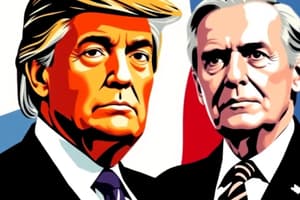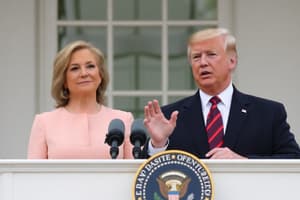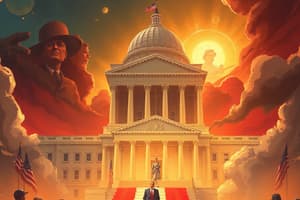Podcast
Questions and Answers
What are the 8 roles that are given to the President of the United States?
What are the 8 roles that are given to the President of the United States?
Chief of State, chief executive, chief administrator, chief diplomat, commander in chief, chief legislator, party chief, and chief citizen.
What does chief of state mean?
What does chief of state mean?
The ceremonial head of the government of the United States, the symbol of all the people of the nation.
What does it mean to be chief executive?
What does it mean to be chief executive?
The President is vested by the Constitution with 'the executive Power' of the United States.
What is the role of the chief administrator?
What is the role of the chief administrator?
What is expected of the chief diplomat?
What is expected of the chief diplomat?
What are the powers of the commander in chief?
What are the powers of the commander in chief?
What is the role of the chief legislator?
What is the role of the chief legislator?
What is the chief of party?
What is the chief of party?
What is the chief citizen?
What is the chief citizen?
What are the formal qualifications to become president?
What are the formal qualifications to become president?
What is a term for the President?
What is a term for the President?
What is the limit for the number of terms that a President can serve?
What is the limit for the number of terms that a President can serve?
What is the 22nd Amendment?
What is the 22nd Amendment?
What is the 'no-third-term tradition'?
What is the 'no-third-term tradition'?
How long is a presidential term?
How long is a presidential term?
How much is the president paid annually?
How much is the president paid annually?
How much is the President's expense allowance?
How much is the President's expense allowance?
What is the president's annual travel allowance?
What is the president's annual travel allowance?
What is the president's entertainment allowance?
What is the president's entertainment allowance?
How much is the president allotted for franking?
How much is the president allotted for franking?
What are the housing privileges of the President?
What are the housing privileges of the President?
How does the President travel?
How does the President travel?
How does the Constitution provide for presidential succession?
How does the Constitution provide for presidential succession?
What is the order of succession set by the Presidential Succession Act of 1947?
What is the order of succession set by the Presidential Succession Act of 1947?
How does the Vice President become the 'acting' President?
How does the Vice President become the 'acting' President?
What is the role of the Vice President?
What is the role of the Vice President?
What were the Framer's original provisions for choosing the President?
What were the Framer's original provisions for choosing the President?
How did the 12th Amendment change how the President and Vice President are chosen by the Electoral College?
How did the 12th Amendment change how the President and Vice President are chosen by the Electoral College?
What is the function of the electoral college today?
What is the function of the electoral college today?
What are the three major defects in the Electoral College?
What are the three major defects in the Electoral College?
What are two major strengths of the Electoral College?
What are two major strengths of the Electoral College?
Flashcards are hidden until you start studying
Study Notes
Presidential Roles and Responsibilities
- The President of the United States serves eight key roles: Chief of State, Chief Executive, Chief Administrator, Chief Diplomat, Commander in Chief, Chief Legislator, Party Chief, and Chief Citizen.
- As Chief of State, the President acts as the ceremonial head of the government, symbolizing the nation and its people.
- Chief Executive powers are outlined in the Constitution, empowering the President to manage broad domestic and foreign affairs.
- The President functions as Chief Administrator, overseeing one of the world's largest bureaucracies with over 2.7 million employees and a budget nearing $2 trillion.
- In the role of Chief Diplomat, the President shapes foreign policy and serves as the primary spokesperson for the U.S. to the global community.
- As Commander in Chief, the President has direct control over the 1.4 million armed forces personnel in the U.S. military.
- The Chief Legislator is responsible for setting public policy and influencing Congressional agendas.
- The President is recognized as the leader of the political party in power and must act as the Chief Citizen, representing all people and balancing private interests.
Qualifications and Terms
- Formal qualifications for presidency: must be a natural born citizen, at least 35 years old, and have resided in the U.S. for at least 14 years.
- Presidential term length is four years, established by the Framers during the creation of the Constitution.
- The 22nd Amendment, ratified in 1951, limits the President to two terms, institutionalizing the "no-third-term tradition" established by previous presidents.
Compensation and Benefits
- The President's salary is set at $400,000 annually, accompanied by a $50,000 expense allowance and $100,000 for nontaxable travel expenses.
- Additional allowances include $19,000 for entertainment and $10,000 for franking expenses.
- The President resides in the White House, a 132-room mansion, and travels using two private Air Force One jets.
Presidential Succession and the Vice President
- The 25th Amendment clarifies that the Vice President assumes the presidency if the sitting President is unable to perform duties.
- The Presidential Succession Act of 1947 establishes the order of succession as Vice President, Speaker of the House, President Pro Tempore of the Senate, and Secretary of State.
- The Vice President's responsibilities include presiding over the Senate and assessing presidential disability.
Electoral Process
- Originally, the President was elected by a group of presidential electors casting two votes—one for President and one for Vice President.
- The 12th Amendment altered this process by requiring electors to cast separate votes for President and Vice President, pairing them on the ballot.
- Currently, electors are selected based on the popular vote within each state, convene to vote in December, and results are counted in January.
- Defects of the Electoral College include the possibility of winning the popular vote but losing the electoral vote, lack of obligation for electors to follow the popular vote, and unequal influence of states in the event of a tie.
- Strengths include its established process and the quick resolution of most presidential elections.
Studying That Suits You
Use AI to generate personalized quizzes and flashcards to suit your learning preferences.




